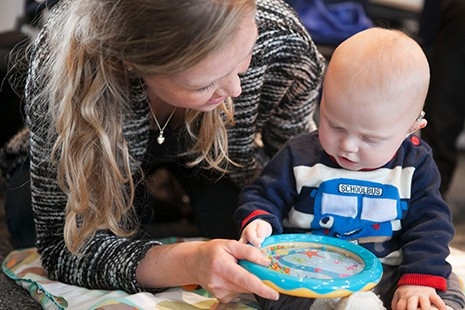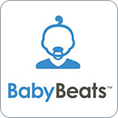
Help Your Little One Develop Listening, Language, and Communication
Your child has a natural interest in interacting and communicating. With their cochlear implants they can hear you laugh, talk, and sing! Nurture and develop their early communication skills with resources developed to provide stimulating and engaging experiences at home and in their nursery… begin the Hearing Journey with Advanced Bionics and the BabyBeats™ early intervention resource!
Babies Learn to Listen Through Music
Babies and toddlers learn to communicate before they can talk!
Talking and singing is the most natural way to bond with your baby and to develop their communication.
Research shows that musical interactions lay the foundation for early communication, listening, and cognitive development. Before babies understand words, they respond to the pitch and emotion in your voice, so sing your heart out!

Discover how to use music with your child following identification of a hearing loss with BabyBeats. Baby and toddler brains are able to absorb a comprehensive world of sounds, voice and music- before and after receiving hearing aids and/or cochlear implants, so make the most of this special time together right from the start!
To start developing your baby’s listening and communication skills, download the BabyBeats app today.

BOND through musical experiences together
PLAY with fun multisensory activities
LEARN with movements and vibrations
"My little girl loves BabyBeats and is focussing and listening so well! Her attention to it and enjoyment of it is wonderful to watch. After using it so long, it is nice to see the progress she is making and how her responses change over time. I also take it to my daughter’s mainstream nursery and it is also being used there. Fantastic resource!"
— Mother of Rachel
Sing and Play Everyday
For a child using cochlear implants, the home environment is key to optimizing listening and language development. The Listening Room is a great place to find many activities that introduce or reinforce new vocabulary, strengthen or develop language skills, and improve social skills without the need to visit a clinic.
Our Education Center offers information about the benefits of listening with the Advanced Bionics cochlear implant system and provides the fundamental resources to promote language and listening skills in your child.
Give Your Child a Strong Start
The Parent Journal and Record Keeper is a special place for you to document your child’s hearing journey. Use this journal to store important information and records regarding your child and share them with your Hearing Health Care professional, your family, and anyone who regularly takes care of your child. Introduce the Young Children Literacy Strategies to your toddler’s pre-school or use the Early Intervention Communicative Log from our comprehensive Tools for Toddlers suite of resources.
Francois, C., & Schon, D. (2011). Musical expertise boosts implicit learning of both musical and linguistic structures. Cerebral Cortex (New York, N.Y.: 1991), 21(10), 2357-2365.
Papousek M. (1996) Intuitive parenting: a hidden source of musical stimulation in infancy. In: Deliege I, Sloboda J, eds. Musical Beginnings. Oxford, UK: Oxford University Press; 88 -112.
Patel, A.D. (2003). Language, music, syntax and the brain. Nature Neuroscience: 6(7):674-681.
Phillips-Silver J, Trainor L. (2005) Feeling the beat: Movement influences infant rhythm perception. Science; 308:1430.
Shenfield T, Trehub S, Nakata T. (2003) Maternal singing modulates infant arousal. Psychol Music; 31:365-375.
Welch G. (2006) The musical development and education of young children. In: Spodel B, Saracho O, eds. Handbook of Research on the Education of Young Children. Mahwah, NJ: Lawrence Erlbaum Associates Inc.; 251-267.



